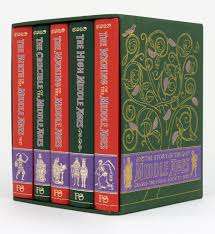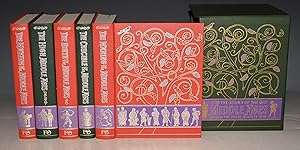The Story of the Middle Ages:The Birth of the Middle Ages / The Crucible of the Middle Ages / The Making of the Middle Ages / The High Middle Ages / The Waning of the Middles Ages
Published by Folio Society, 1998, five volumes, hardcovers, with decorated slipcase illustrated, 20 cms x 18.5 cms x 23.8 cms, condition: new.
This is the absorbing study of the main personalities and the influences that molded the history of Western Europe from the late tenth to the early thirteenth century, describing the chief forms of social, political, and religious organization.
An acknolwedged classic of European history, R.W. Southern's "The Middle Ages" focuses on the period between 900 and 1200 A.D. The focus is mostly northern france, with excursions to Germany, Italy, Southern France and England. The main thesis is that this period saw the emergence of a personal devotion to faith via monasticism that in turn prefigured the rise of invdividual identity in western culture.
Southern's style of writing is charming and concise. You don't get the thesis till the last chapter, but the preceding chapters are entertaining, enjoyable reading. The author who turned me on to this book was the recently deceased Norman F. Cantor in his dishy "The Making of the Middle Ages", which I also recommend for any one who is reading on this subject outside the academy. Cantor's main point was to show how the empire building mind set of the "Annales" school of the history of the middle ages (which concentrates its focus on the role of the peasant in the society of the middle ages), had deprived other "schools" of much needed oxygen. Well, he didn't put it that way exactly, but that's what he said. Cantor, of course, studied under Southern, so the bias is there. None the less, having read several books from the Annales school and none from Southern and his progeny, I would have to say that the two compliment one another (and Southern cites Marc Bloch, the much revered founder of Annales school).
Great books should be outstanding not only in literary content but also in their physical form: this has always been the philosophy of the publishers, The Folio Society (FS). FS books as tactile and aesthetic objects has been a constant hallmark. FS beleives reading is enhanced by the book itself, in which typography, illustration, paper, printing and binding all play a part in creating a harmonious whole. In a world of declining publishing standards, where most books are cheaply printed, and bound using low-grade materials, The Folio Society resolutely sets store by traditional values of excellence. From introducers who make up the great names of modern literature and academia, and editors and picture researchers who ensure unrivalled standards of research and textual work, to artists who have swept the board in so many illustrations awards FSo offers a complete experience for the book-lover.








